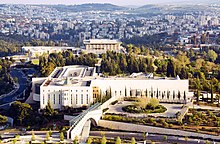
Back المحكمة العليا (إسرائيل) Arabic Tribunal Suprem d'Israel Catalan Nejvyšší soud Státu Izrael Czech Oberstes Gericht (Israel) German Ανώτατο Δικαστήριο του Ισραήλ Greek Supera Tribunalo de Israelo Esperanto Corte Suprema de Israel Spanish دادگاه عالی اسرائیل Persian Cour suprême d'Israël French Tribunal Supremo de Israel Galician
| Supreme Court of Israel | |
|---|---|
| Hebrew: בית המשפט העליון Arabic: المحكمة العليا | |
 Emblem of Israel[1] | |
 | |
 | |
| 31°46′51″N 35°12′13″E / 31.78083°N 35.20361°E | |
| Established | 1948 |
| Location | Givat Ram, Jerusalem |
| Coordinates | 31°46′51″N 35°12′13″E / 31.78083°N 35.20361°E |
| Composition method | Presidential appointment upon nomination by the Judicial Selection Committee |
| Authorized by | Basic Laws of Israel |
| Number of positions | 15 |
| Website | https://supreme.court.gov.il |
| President | |
| Currently | Uzi Vogelman (acting) |
| Since | 17 October 2023 |
| Lead position ends | TBD |
| Jurist term ends | 6 October 2024 |
| Deputy President | |
| Currently | Uzi Vogelman |
| Since | 9 May 2022 |
| Lead position ends | 6 October 2024 |
| Jurist term ends | 6 October 2024 |
The Supreme Court of Israel (Hebrew: בֵּית הַמִּשְׁפָּט הָעֶלְיוֹן, romanized: Beit haMishpat haElyon; Arabic: المحكمة العليا, romanized: al-Maḥkama al-‘Ulyā) is the highest court in Israel. It has ultimate appellate jurisdiction over all other courts, and in some cases original jurisdiction.
The Supreme Court consists of 15 judges appointed by the President of Israel, upon nomination by the Judicial Selection Committee. Once appointed, Judges serve until retirement at the age of 70 unless they resign or are removed from office. The Presidency of the Supreme Court is currently vacant, following the retirement of Esther Hayut. As such, Deputy President Uzi Vogelman is serving as acting President. The Court is situated in Jerusalem's Givat Ram governmental campus, about half a kilometer from Israel's legislature, the Knesset.
When ruling as the High Court of Justice (Hebrew: בֵּית מִשְׁפָּט גָּבוֹהַּ לְצֶדֶק, Beit Mishpat Gavo'ah LeTzedek; also known as its acronym Bagatz, בג"ץ), the court rules on the legality of decisions of State authorities: government decisions, those of local authorities and other bodies and persons performing public functions under the law, and direct challenges to the constitutionality of laws enacted by the Knesset. The court may review actions by state authorities outside of Israel.
By the principle of binding precedent (stare decisis), Supreme Court rulings are binding upon every other court, except itself. Over the years, it has ruled on numerous sensitive issues, some of which relate to the Israeli–Palestinian conflict, the rights of Arab citizens, and discrimination between Jewish groups in Israel.
On 24 July 2023, the 25th Knesset "passed the bill to cancel the reasonableness standard into law", which could diminish the power of the Supreme Court to check future actions of the government.[2] On 1 Jan 2024 the Supreme Court overturned that change in an 8-7 decision.[3][4][5]
- ^ Version of emblem of Israel used by the Judicial Authority. court.gov.il
- ^ Reasonableness bill passes 64-0 after compromise falls at last minute
- ^ "High Court strikes down reasonableness amendment". Globes. January 1, 2024. Retrieved January 1, 2024.
- ^ "High Court ruling undoes sole achievement of government's judicial overhaul". The Times of Israel. January 1, 2024. Retrieved January 1, 2024.
- ^ Edwards, Christian (January 2, 2024). "What we know about Israel's Supreme Court ruling on Netanyahu's judicial overhaul". CNN. Retrieved January 2, 2024.
© MMXXIII Rich X Search. We shall prevail. All rights reserved. Rich X Search